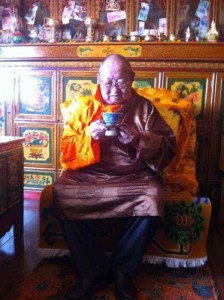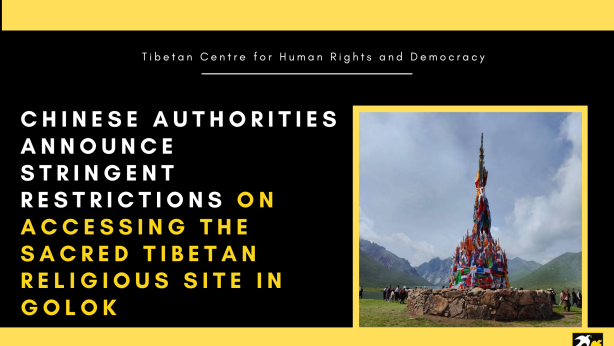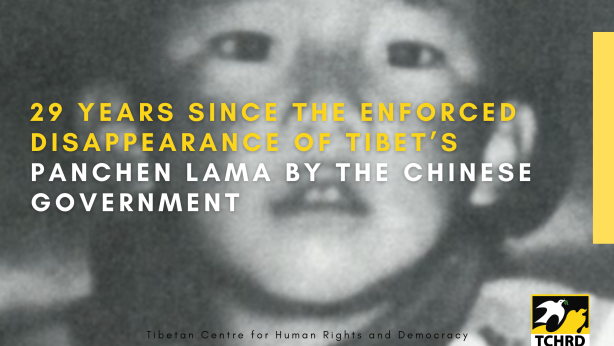Ancient Tibetan monastery under siege over reincarnation issue; mother of two attempts suicide protest

A Tibetan monastery with over 300 years of history has been shut down indefinitely after Chinese authorities attempted to impose its own choice of reincarnation on the monastery in Nagchu (Ch: Naqu) Prefecture in Tibet Autonomous Region (TAR).
Shak Rongpo Gaden Dhargyeling Monastery, located in Shakchu (Ch: Xiaqu) Township in Nagchu County, has been under intense pressure and restriction since 2010 when local authorities arrested and sentenced a senior spiritual teacher, Lama Dawa Rinpoche, to seven years in prison on charges that he contacted His Holiness the Dalai Lama during the search for the ninth reincarnation of Rongpo Choeje, the head lama of the monastery. The previous eighth incarnation of Rongpo Choeje passed away on 14 August 1999. The first Rongpo Choeje founded the monastery under the guidance of the fifth Dalai Lama some 300 years ago.
According to information received by TCHRD, out of 113 big and small monasteries in Nagchu Prefecture, Shak Rongpo Monastery has been blacklisted among the top group of reactionary monasteries, undeserving of any measure of official leniency.
On 30 July 2013, the monastery was closed indefinitely after monks left to escape harassment and political education sessions. A source told TCHRD, “Monks have left the monastery to escape harassment and political education. They have petitioned many times for the release of Lama Dawa but the authorities did nothing. The monastery faced problems gathering for daily prayers and other religious activities, even the famous Gutor ritual [annual ritual to destroy nine- evil forces] has ceased.”
In an unmistakable sign that the spiritual mess created by Chinese authorities has reached deadly limits, sources with contacts in Nagchu reported an attempted suicide by a Tibetan mother of two to protest China’s decision to impose its own choice of reincarnation to head the Shak Rongpo Monastery and the detention of her husband, Lobsang Tsering. Sources said Dolma Yangkey, 28, had called on the Chinese authorities to stop creating tension and discord in the monastery and her village; release all Tibetans, including her husband, who had been detained recently; and to withdraw the decision to impose a reincarnation. When her appeals fell on deaf ears, she rode on her motorbike at a high speed with the intention to kill herself. Soon she fell off and sustained serious injuries. Police later took her to a hospital in Nagchu Prefecture where she is being treated. Visitors have been barred from visiting her as some police officers are stationed at the hospital to watch over her.
Dolma Yangkey’s husband Lobsang Tsering was among the 50 Tibetans detained by local police few days before the closure of the monastery when local Tibetans clashed with permanent ‘work team’ cadres stationed at the monastery. In turn, armed police beat up the Tibetans many of who had either been hospitalised or detained at an undisclosed location. Local authorities have sent the couple’s two small children to an orphanage in Nagchu Prefecture despite the fact that the children’s maternal grandparents, Amchi Namsey and Choeying Dolma, have adequate means to support the children.
Among those detained in mid-July 2013, TCHRD has identified nine Tibetans: Lobsang Tsering, 27; Dhungphug, 26; Dagyal, 35; Karma, 31; Gyalhug, 28; Gyalwa, 29; Sichoe, 39; Choedar, 27 and Jampa, 21. They belong to Tsalhi Village, Yarthang Marthang Village and Tarchen Township. All those detained, numbering about 50, had been brutally beaten; in particular, Dhungphug received life-threatening injuries due to police beatings. He is believed to be receiving treatment at an unknown hospital. Dhungphug had been detained earlier in 2010 but was released a month later. The identities of others who were detained remain unknown. All of them are being treated or detained at an undisclosed location.
Local Tibetans in Nagchu County have been at loggerheads with the authorities for the past five years. There is a high level of resentment and disapproval among local Tibetans against the government’s move to enthrone its own choice of the ninth reincarnation of Rongpo Choeje, the spiritual head of Shak Rongpo Monastery. Lama Dawa Rinpoche was apparently involved in the search for the next reincarnation. Lama Dawa, 78, was first detained on 17 May 2010 in Lhasa. He was released a month later stripped of all his positions at the monastery and was ordered not to maintain any contacts with the monastery. Restriction on his movement was imposed; Thogo la, located near Nagchu Town, was the furthest he could go. He was later charged of colluding with the Dalai Lama to find the reincarnation of Rongpo Choeje and sentenced to seven years in prison. His health remained poor all through his detention, arrest and sentencing process. He was arrested again and sentenced to seven years.
Four other Tibetans including three monks from Shak Rongpo Monastery: Dhungphug, Ngawang Jangchup, Ngawang Thokmey, and a lay man Tashi Dhondup were also detained but were released after sometime. However, Ngawang Jangchup, 35, a staff of Shak Rongpo Monastery, was sentenced to two years in prison on charges of keeping a portrait of the Dalai Lama in his residence. Latest information about Lama Dawa, obtained sometime in July 2013, indicated that he was under house arrest receiving treatment under heavy security blanket in Lhasa. It is not clear whether Lama Dawa has to complete prison sentence after his treatment. At least one source told TCHRD that Lama Dawa is on a medical parole.
Lama Dawa’s arbitrary detention and sentencing have increased tension and resentment among local Tibetans. And local authorities have responded by increasing propaganda education among monastic and lay communities, beefing up police presence and staging intimidating, orchestrated visits from high-level official delegation, or as the state media says “inspection team”, to the besieged monastery. On 23 August 2013, under the shadow of an ongoing 20-day ‘patriotic education’ campaign being implemented at Shak Rongpo Monastery, a high-level inspection team consisting of top Party leaders of TAR visited the monastery, reported the official Tibetan language version of People’s Daily on 28 August 2013. In the inspection team was TAR vice-Party secretary Wu Yingjie; TAR Party Committee member and Nagchu Prefecture Party secretary Dothog; TAR vice-governor and deputy secretary of TAR Politics and Law Committee Kelsang Tsering; vice-chairman of TAR Chinese People’s Political Consultative Conference (CPPCC) and head of TAR Buddhist Association of China (BAC) Dupkhang Thupten Khedup; and vice-chairman of TAR CPPCC and vice-chairman of TAR United Front Work Department (UFWD) Sonam Rinzin. The report said the objective of the visit was to increase the “management of the monastery focusing particularly on innovative management measures so that Buddhism can adapt to socialism thereby creating stability and harmony in the monastery”.
Sources with contacts in Nagchu said authorities have set up five armed police contingents, consisting of about 2000 armed policemen, in Shakchu, Shora, Dathang, Gesoedo and Humkang Sumdo townships in Nagchu County. During daytime, the armed police, brandishing rifles, conduct daily patrol in their vehicles.
The relentless political education sessions has disrupted normal religious activities, making it impossible to hold routine prayer sessions and special prayer ceremonies. Holding routine prayer sessions had become impossible alongside ‘patriotic education’, which demands complete loyalty and allegiance to the Communist Party of China and total denouncement of the Dalai Lama, the Tibetan spiritual leader. Many monks had been forced to flee the monastery to escape daily onslaught of political education. There has been no information so far on the reopening of the monastery, save for the visit of the high-level TAR Party delegation when monks and local Tibetans were forced to line up holding khatas given by ‘work team’ members to welcome the inspection team.
This is not the first time that Shak Rongpo Monastery was closed due to official interference. The ‘5/20 incident’, dubbed as such by the state media, led to the closure of the monastery in 2010 after monks fled to avoid participation in ‘patriotic education’ campaigns which requires them to denounce the Dalai Lama. On 20 May 2010, less than three days after the arrest of Lama Dawa Rinpoche, over 50 local officials and about 150 armed policemen arrived at the monastery and forced political education on the monks, ordering them to denounce the Dalai Lama and Lama Dawa, and maintain no contacts with Lama Dawa. The monks were told that Lama Dawa was no longer a reincarnated lama since he was a follower of the Dalai Lama and not the Party. The official denunciation of Dalai Lama and stripping Lama Dawa of all his spiritual positions at the monastery had emotionally taken a toll on the lives of at least two known monks. During the political education session, monk Jampa fell unconscious, unable to control his emotions, and monk Tashi Tensang who was also a prefect at the monastery became sick. Prefect Tashi Tensang later lost his job at the monastery.
Shortly after, monk Ngawang Gyatso, 70, committed suicide at his residence. He had left many letters he had written over an extended period of time, but the contents of these letters remain unknown as they were seized by local officials. Monks were ordered not to discuss the suicide with outsiders, or else face imprisonment.
In July 2010, the monastery was reopened but unresolved tensions flared up within no time. On 17 July 2010, monk Ngawang Lobsang, a senior staff at the monastery along with 17 other monks submitted a petition to the local authorities calling for the reinstatement of religious ties between Lama Dawa and the monastery and end the denunciation campaigns against the Dalai Lama and Lama Dawa. The petition was ignored and the monks left the monastery. They are now required to report themselves to the local government office every week, and they are not allowed to venture beyond the border of Nagchu County.
In July 2013, when the monastery was on the verge of shutdown, about 50 local Tibetans clashed with ‘work team’ members and cadres, who were permanently stationed at the monastery as part of the government’s new policy of creating ‘harmonious, law-abiding model monasteries and nunneries’. The policy was implemented in the late 2011, although ‘experimental’ projects might have been implemented earlier in other Tibetan areas. At Shak Rongpo Monastery, in preparation for the visit of TAR Party delegation, the permanent ‘work team’ members and cadres ordered local Tibetans to bring khatas to welcome the TAR Party delegation. Monks and local Tibetans objected saying they could not appear happy when the monastery and the village continued to suffer. This led to fiery exchanges between ‘work team’ cadres and local Tibetans, which quickly ended in a clash between the two sides. About 50 Tibetans, including Dolma Yangkey’s husband Lobsang Tsering, were brutally beaten up and detained.
Shak Rongpo Gaden Dargyeling Monastery was founded by the first Rongpo Choeje, Drubthob (Yogi) Lobsang Trinley. The monastery was founded on the decree of the Great Fifth Dalai Lama after a prophecy conducted by the Nechung Oracle in the Iron-dragon year of the 11th Rabjung (17th century). Since the founding of the monastery, there had been eight reincarnations of the head lama Rongpo Choeje.


